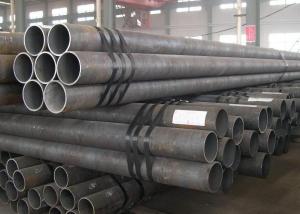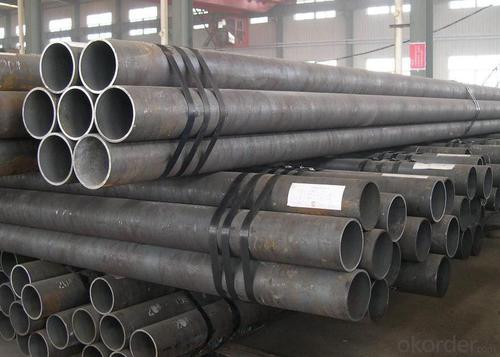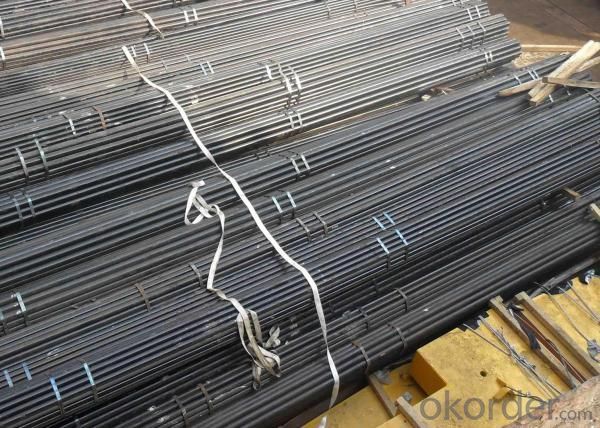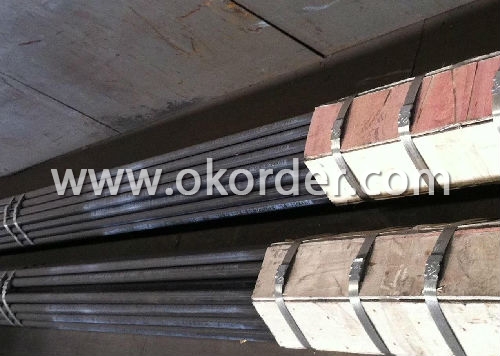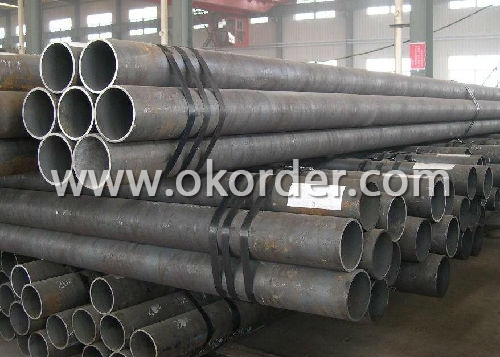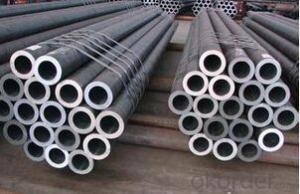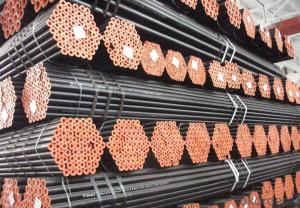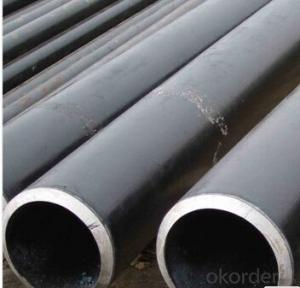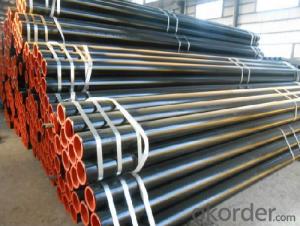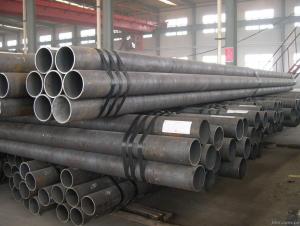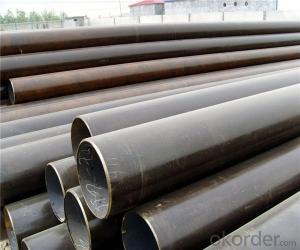High Quality Seamless Steel Tubes And Pipes For Low And Medium Pressure Boiler
- Loading Port:
- China Main Port
- Payment Terms:
- TT or LC
- Min Order Qty:
- 20MT m.t.
- Supply Capability:
- 5000 Tons Per Month m.t./month
OKorder Service Pledge
OKorder Financial Service
You Might Also Like
Specifications of High Quality Seamless steel tubes and pipes for low and medium pressure boiler:
Usage/Application of High Quality Seamless steel tubes and pipes for low and medium pressure boiler: It can be used for transmitting a large number of fluid. Such as oil, natural gas, water and some solid materials. At the same time it can be widely used as the manufacture of various structural parts and mechanical parts, as well as building construction.
Packaging/Delivery of High Quality Seamless steel tubes and pipes for low and medium pressure boiler: Wrapped in bundles with steel strips or according to customers' requirements
| |||||||||||||||||||||||||||||||||||||||||||||||||||||||||||
- Q: How are steel pipes used in the agricultural irrigation systems?
- Due to their strength and durability, steel pipes are widely used in agricultural irrigation systems. These pipes effectively transport water from a well or reservoir to the fields where crops are cultivated. One major advantage of using steel pipes in such systems is their ability to withstand high pressure and heavy loads, making them suitable for the transportation of large volumes of water over long distances without the risk of bursting or breaking. Additionally, steel pipes exhibit a high resistance to corrosion, which is crucial in agricultural settings where they may come into contact with fertilizers or other chemicals. Aside from their durability, steel pipes offer a smooth interior surface that minimizes friction and ensures a consistent water flow. This is essential in irrigation systems as it guarantees even water distribution across the fields, promoting optimal crop growth. Moreover, steel pipes can be easily connected and configured to meet the specific layout and requirements of the irrigation system. In summary, steel pipes play a crucial role in agricultural irrigation systems by facilitating the efficient and reliable transportation of water to crops. Their strength, durability, resistance to corrosion, and smooth interior surface make them an ideal choice for these applications.
- Q: How are steel pipes used in the automotive exhaust system?
- Steel pipes are used in the automotive exhaust system to transport and direct the flow of exhaust gases from the engine to the rear of the vehicle. These pipes are durable, heat-resistant, and corrosion-resistant, making them suitable for withstanding the high temperatures and harsh conditions of the exhaust system. Additionally, they help reduce noise and emissions by providing a pathway for the gases to exit the vehicle efficiently.
- Q: Are steel pipes suitable for wastewater treatment facilities?
- Yes, steel pipes are suitable for wastewater treatment facilities. Steel pipes are commonly used in these facilities due to their high strength, durability, and resistance to corrosion. Wastewater treatment facilities typically handle corrosive and abrasive materials, and steel pipes are able to withstand these harsh conditions. Additionally, steel pipes are available in various sizes and configurations, allowing for easy installation and customization to meet the specific needs of the facility. Furthermore, steel pipes can be easily repaired or replaced if necessary, ensuring the longevity and reliability of the wastewater treatment system. Overall, steel pipes are a suitable choice for wastewater treatment facilities due to their strength, durability, corrosion resistance, and flexibility in installation and maintenance.
- Q: How to descaling galvanized steel pipe?
- Is red rust or white rust, red rust is the base material rust, white rust is Zinc Coating Rust
- Q: How are steel pipes used in hydroelectric power plants?
- Steel pipes are used in hydroelectric power plants to facilitate the transportation of water from the reservoir to the turbines. These pipes are essential for maintaining a steady flow of water, which is crucial for generating electricity through the rotation of turbines. Additionally, steel pipes are employed in the construction of penstocks, which are large pipes directing water towards the turbines, ensuring efficient energy production in hydroelectric power plants.
- Q: How are steel pipes used in the manufacturing of chemical storage tanks?
- Steel pipes are used in the manufacturing of chemical storage tanks for their durability, strength, and resistance to corrosion. These pipes are utilized for the construction of the tank's framework, as well as for the transport of chemicals within the tank. The steel pipes provide a reliable and secure infrastructure, ensuring the safety and integrity of the chemicals stored inside the tank.
- Q: How are steel pipes used in the water supply system?
- Steel pipes are commonly used in the water supply system due to their durability, strength, and corrosion resistance. They are used to transport water from water treatment plants to homes, buildings, and industries. Steel pipes are also used for underground water mains, as they can withstand high pressures and are less likely to leak or break. Additionally, steel pipes are often used in water storage tanks and pumping stations to ensure a reliable and efficient water supply.
- Q: What's wrong with the 3PP anticorrosive steel tube?
- That is, polypropylene corrosion resistant coating of steel pipe, the biggest feature of this anti-corrosion coating is good heat resistance.
- Q: What is lined pipe?
- Pipe lining is a new technology in recent ten years of development, also called composite pipe conveying fluid with different needs, the use of different materials to make the durability of the pipeline inner wall and outer wall of pipeline, to ensure the purity of the fluid, pipeline adaptability, performance is greatly improved, more extensive use.
- Q: How are steel pipes insulated to prevent heat loss?
- Steel pipes are typically insulated to prevent heat loss by wrapping them with insulation materials such as mineral wool, fiberglass, or foam. These insulation materials provide a barrier that traps heat within the pipes, preventing it from being lost to the surrounding environment. Additionally, pipes may also be covered with an outer protective layer, such as aluminum or PVC, to further enhance insulation and protect against external elements.
1. Manufacturer Overview
| Location | Jiangsu, China |
| Year Established | 1992 |
| Annual Output Value | 60,000Tons |
| Main Markets | Europe and the United States;Canada; India;Bulgaria; South Korea;etc. |
| Company Certifications | API 5L;API 5CT;GB/T19001-2008 idt ISO9001:2008 |
2. Manufacturer Certificates
| a) Certification Name | |
| Range | |
| Reference | |
| Validity Period |
3. Manufacturer Capability
| a) Trade Capacity | |
| Nearest Port | Yan Cheng |
| Export Percentage | 50% - 60% |
| No.of Employees in Trade Department | 400-500 People |
| Language Spoken: | English; Chinese; Spanish |
| b) Factory Information | |
| Factory Size: | Above 110,000 square meters |
| No. of Production Lines | Above 10 |
| Contract Manufacturing | OEM Service Offered; Design Service Offered |
| Product Price Range | Average |
Send your message to us
High Quality Seamless Steel Tubes And Pipes For Low And Medium Pressure Boiler
- Loading Port:
- China Main Port
- Payment Terms:
- TT or LC
- Min Order Qty:
- 20MT m.t.
- Supply Capability:
- 5000 Tons Per Month m.t./month
OKorder Service Pledge
OKorder Financial Service
Similar products
Hot products
Hot Searches
Related keywords
